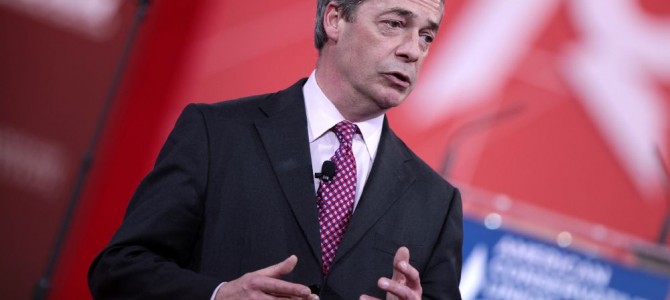
And then there were 27.
Great Britain has voted to leave the European Union. For Nigel Farage and the Brexit Tories, this is a stunning victory and a fresh new page. Progressive liberals (in Britain and elsewhere) experienced it as a bruising, river-flowing-backwards defeat. It turns out that history doesn’t always and inevitably move in just one way.
In America and the rest of Europe, this historic moment invites reflection on cultural currents that are moving throughout the West. On multiple fronts we are witnessing a rejection of progressive, globalist initiatives and superstructures in favor of more particular traditions, tribes, nations and subcultures. It seems not everyone wants to be a “citizen of the world.”
It’s a Big World After All
These movements are, to a great degree, the fruits of liberal arrogance. Progressive technocrats have always resisted local autonomy, believing they can arrange most people’s lives better than people themselves would. It isn’t necessary to understand the traditions or cultures that the engine of progress steamrolls. They’re on the wrong side of history, and that’s all we need to know.
Apparently it isn’t. Sometimes those traditions and sub-cultures re-assert themselves. Sometimes power can be devolved to more local levels. Sometimes England decides it wants to be England again.
The Brexit vote is exciting to many conservatives as an example of how this can happen. That’s reasonable. The immediate aftermath will probably be ugly, but at least Britain will give the world an early glimpse of what a post-EU world might be. Other nations can then decide what lessons they wish to draw.
One lesson should already be evident, from Brexit and from Trumpism, along with rising nationalist parties in Austria, Denmark, Switzerland, Hungary, and France. People will not forever consent to be led by the nose by cosmopolitans. A lifetime membership in the Brotherhood of Man is not sufficient for their thriving.
What people want is membership in more particular communities and traditions. They understand that membership conditions are a natural component of that. That’s one major reason the culture wars (in which contending sub-cultures vie for resources and social space) rage so hot. It’s also why immigration has become such a contentious issue in recent years.
Everyone Is a Little Bit Tribal
Man is a social animal. Every person (apart from beasts and gods) wants to belong somewhere. We don’t want to spend our lives alone.
Belonging usually comes through a series of nested and interlocking memberships. We are citizens of nations and counties and townships; we have both immediate and extended families; we join churches and clubs and private Facebook groups. Each of these memberships comes with obligations, but also with support from people who are obliged to stick with us through at least some personal inconvenience. (How much and what kind depends on the nature of the community.) We might think of these as our “tribes.” They keep us from being alone. To a point, tribes are a good and necessary part of human life.
At the same time, tribes can also be socially destructive. They can be a source of rivalry and enmity. They can be provincial or repressive. They can go to war.
This partly explains why progressive cosmopolitans are perpetually anxious to “manage” our tribal memberships for us, through laws or massive political organizations. They want to make sure that everyone plays nice and gets along and finds a place in the world with whatever benefits liberals think they should have.
That top-down management hasn’t worked as well as advertised. It’s increasingly clear, too, that the people in charge have their own tribes, loyalties, and controversial agenda to impose on the rest of the world. Many people are tired of that, and want to wrest control away from their (mostly progressive) elites and return it to more local communities. In many respects that’s something to celebrate, but we should have a care. Sometimes tribes get tribal, in a bad way.
Wanted: Humane Cultural Leaders
Tribes can define themselves in a wide variety of ways. We can immerse ourselves in the art, literature, philosophy, and cultural customs of our particular traditions. That’s generally good and humanizing. Alternatively, we can maintain our own identities by looking on outsiders with hatred and fear. That’s generally bad.
In the coming years, much may turn on our success at bolstering the positive elements of our cultures and traditions while tamping down bigotry, xenophobia, and the predatory desire to exploit the weaknesses of others. As far as possible, we should respect and honor differences, but even when we hit the limits of that respect, there is still a need for tolerance. Both will be facilitated more easily when people are secure enough in their own traditions that they can look outwards without losing their community identities.
The immigration debates illustrate the relevant ambiguities. The recent influx of immigrations into Europe (and to a lesser extent the United States) has given rise to some real social problems. It’s certainly possible to be concerned about those without being a bigot or a xenophobe, and progressive liberals are sometimes quite unfair in tarnishing all critics of immigration with the same brush.
At the same time, in engaging with outspoken immigration hawks, one does meet with a fair amount of ignorance, prejudice, and resentment, of a sort that could reasonably be termed “xenophobia.” Tribes can be perilous.
Moving forward, we need to make energetic efforts to explore our traditions in a way that is broad, deep, and humane. Cultivate tolerance and generosity. Encourage people to pass on their traditions peacefully, to proselytize lovingly, and to choose the toga over the sword. Only then will it be possible to reap the benefits of tribalism without suffering the drawbacks.









